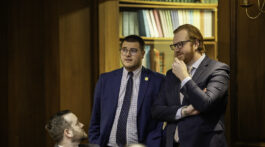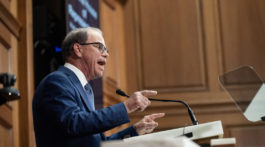A long-awaited forensic review of the Indiana Economic Development Corporation (IEDC) found no evidence of criminal wrongdoing, but raised serious concerns about conflicts of interest, financial oversight, and travel spending practices.
The 121-page report, prepared by FTI Consulting and released October 2, 2025, examined the IEDC, its nonprofit foundation, Elevate Ventures, the Applied Research Institute (ARI), and LEAP/IIP LLC from 2022 through 2024. FTI analyzed more than 20,000 documents and interviewed 27 current and former employees.
Findings
The consultants issued 45 findings and observations. They said the issues “have implications for the responsible use of taxpayer funds. The presence of conflicts of interest, inadequate management, and insufficient controls raises concerns about the potential for favoritism and misuse of public funds.”
FTI stressed the review was not a criminal probe. “This Report is not an opinion, and it is not intended to, and does not, constitute a recommendation to any person to undertake any transaction and does not purport to contain all information that may be required to evaluate the matters set out herein,” the consultants wrote.
Key red flags included:
-
Conflicts of interest: FTI identified 30 entities in which IEDC board members or staff had ties while those entities also received funding. Of 52 contracts, only four were ever discussed in board meetings and just one was disclosed to the State Ethics Commission.
-
Procurement practices: Large contracts, including more than $77 million paid to Pure Development for the LEAP project, were awarded without competitive bidding. FTI wrote, “The IEDC does not consistently apply due diligence procedures or competitive bidding processes to assess third-party vendors prior to contracting.”
-
Travel and entertainment spending: Nearly half of the Indiana Economic Development Foundation’s $13.4 million in outflows went to international trips. FTI found that “a majority of the IEDF’s spending related to international travel,” including “over $86,000 for international car race tickets and events” and “over $700,000 in payments to hotels, including high-end hotels such as the Four Seasons.”
In some cases, family members of state officials joined foreign trips. “Approximately $167,000 in international travel costs related to three family members of state officials” were identified, with only a fraction reimbursed.
The report also highlighted a potential post-employment ethics violation. The IEDC’s former Chief Innovation Officer helped negotiate a $17.5 million contract with ARI, then left to become ARI’s CEO. “Approximately 82% of the former IEDC CIO’s salary at ARI in 2023 is directly related to this specific IEDC contract, indicating a potential violation of post-employment restrictions,” FTI wrote.
No Political Finger-Pointing
The report did not assign blame to former governors Mitch Daniels, Mike Pence, or Eric Holcomb, all of whom oversaw IEDC at different times. Its scope was limited to 2022–2024, the final years of Holcomb’s tenure.
Instead, the consultants emphasized structural problems. “There is a lack of separation between IEDC and IEDF governance structures, policies and procedures, and financial oversight functions,” they observed.
Recommendations
FTI made numerous recommendations, including requiring competitive bidding for major contracts, establishing independent oversight of donations, tightening travel approval processes, and creating a whistleblower system.
The report also urged stronger conflict-of-interest monitoring. “The IEDC does not utilize an automated flag inside its CRM system to identify a reported COI associated with an entity,” FTI noted, adding that meeting minutes often lacked detail about potential conflicts.
Next Steps
IEDC management has already begun reforms. According to the report, “The IEDC has made progress towards implementing some recommendations, including drafting updated donation and travel policies. Additionally, the IEDC has committed to implementing the remaining recommendations, which include having the full board review conflicts of interest, clarifying the Audit & Finance Committee’s role, engaging an outside consultant for an Enterprise Risk Management assessment, and further defining the Ethics Officer’s duties.”
The bottom line, FTI concluded, is that while no crimes were found, serious red flags remain. “Reforms and process improvements are necessary to address these weaknesses and ensure that state funds are used in a transparent and accountable manner.”











